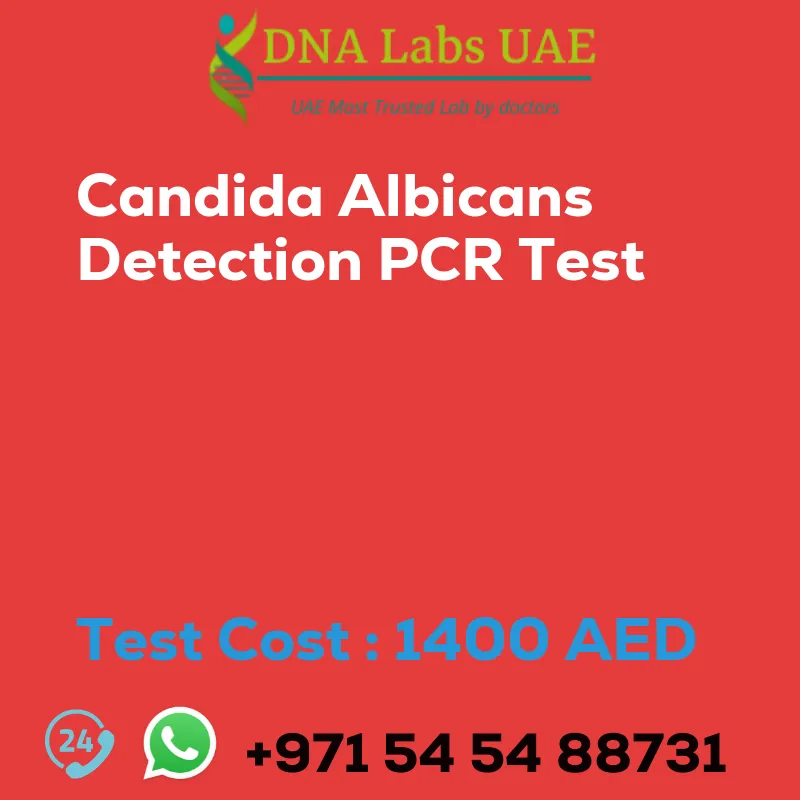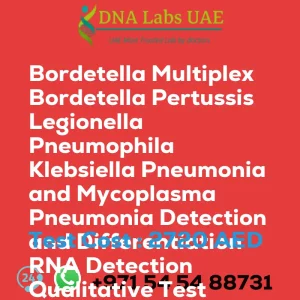Candida Albicans Detection PCR Test
Test Name: Candida Albicans Detection PCR Test
Components: PCR Test Kit
Price: 1400.0 AED
Sample Condition: 1 mL CSF / Sputum / Body fluids in a sterile screw capped container OR Tissue in Normal saline. Ship refrigerated. DO NOT FREEZE.
Report Delivery: Sample Daily by 11 am; Report 13 Working days
Method: PCR
Test Type: Infections
Doctor: Physician
Test Department: Molecular Diagnostics
Pre Test Information: No special preparation required
Test Details:
The Candida albicans detection PCR test is a diagnostic tool used to detect the presence of Candida albicans, a type of yeast that can cause infections in humans. This test utilizes the polymerase chain reaction (PCR) technique to amplify and detect specific DNA sequences of the Candida albicans organism.
During the test, a sample is collected from the patient, typically from the affected area such as the mouth, vagina, or skin. The sample is then processed in a laboratory, where DNA is extracted from the sample. The extracted DNA is then subjected to PCR, which amplifies specific regions of the Candida albicans DNA.
PCR involves multiple cycles of heating and cooling, which allows for the replication of the target DNA sequence. The DNA amplification is achieved by using specific primers that bind to the Candida albicans DNA and initiate the replication process. The amplified DNA is then detected using various methods, such as gel electrophoresis or fluorescent probes.
If the Candida albicans DNA is present in the patient’s sample, the PCR test will generate a positive result, indicating the presence of the yeast. This information can help healthcare professionals diagnose and treat Candida albicans infections more accurately.
The Candida albicans detection PCR test is a highly sensitive and specific method for identifying the presence of this yeast. It can be particularly useful in cases where other diagnostic methods, such as culture or microscopy, may not be as reliable or conclusive. However, it is important to note that PCR tests are typically performed in specialized laboratories and require trained personnel to ensure accurate results.
| Test Name | CANDIDA ALBICANS DETECTION PCR Test |
|---|---|
| Components | |
| Price | 1400.0 AED |
| Sample Condition | 1 mL CSF \/ Sputum \/ Body fluids in a sterile screw capped container OR Tissue in Normal saline. Ship refrigerated. DO NOT FREEZE. |
| Report Delivery | Sample Daily by11 am;Report 13 Working days |
| Method | PCR |
| Test type | Infections |
| Doctor | Physician |
| Test Department: | MOLECULAR DIAGNOSTICS |
| Pre Test Information | No special preparation required |
| Test Details |
The Candida albicans detection PCR test is a diagnostic tool used to detect the presence of Candida albicans, a type of yeast that can cause infections in humans. This test utilizes the polymerase chain reaction (PCR) technique to amplify and detect specific DNA sequences of the Candida albicans organism. During the test, a sample is collected from the patient, typically from the affected area such as the mouth, vagina, or skin. The sample is then processed in a laboratory, where DNA is extracted from the sample. The extracted DNA is then subjected to PCR, which amplifies specific regions of the Candida albicans DNA. PCR involves multiple cycles of heating and cooling, which allows for the replication of the target DNA sequence. The DNA amplification is achieved by using specific primers that bind to the Candida albicans DNA and initiate the replication process. The amplified DNA is then detected using various methods, such as gel electrophoresis or fluorescent probes. If the Candida albicans DNA is present in the patient’s sample, the PCR test will generate a positive result, indicating the presence of the yeast. This information can help healthcare professionals diagnose and treat Candida albicans infections more accurately. The Candida albicans detection PCR test is a highly sensitive and specific method for identifying the presence of this yeast. It can be particularly useful in cases where other diagnostic methods, such as culture or microscopy, may not be as reliable or conclusive. However, it is important to note that PCR tests are typically performed in specialized laboratories and require trained personnel to ensure accurate results. |








